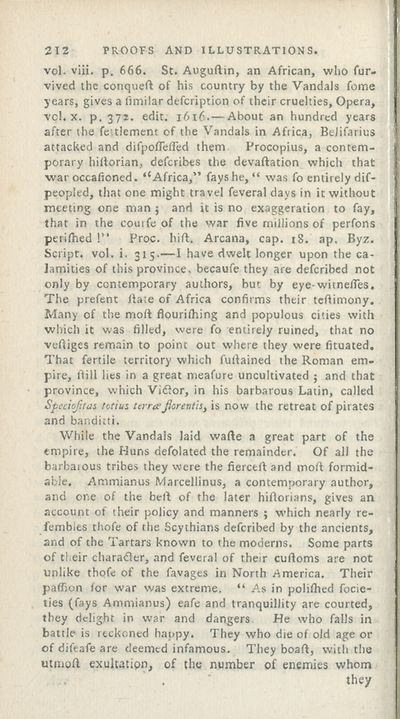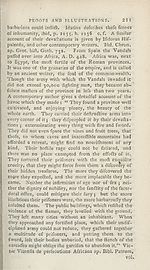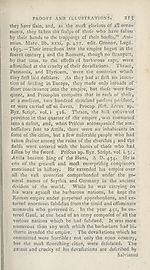Download files
Complete book:
Individual page:
Thumbnail gallery: Grid view | List view

212 PROOFS AND ILLUSTRATIONS.
vol. viii. p. 666. St. Auguftm, an African, who fur-
vived the conqueft of his country by the Vandals fome
years, gives a limilar defeription of their cruelties. Opera,
vcl. x. p.372. edit. 1616. — About an hundred years
after the fettlement of the Vandals in Africa, Belifarius
attacked and difpofleired them Procopius, a contem¬
porary hiltorian, deferibes the devaftation which that
war occafioned. “Africa,” fays he, “ was fo entirely dif-
peopled, that one might travel feveral days in it without
meettng one man ; and it is no exaggeration to fay,
that in the couife of the war five millions of perfons
perifhed I” Proc. hift. Arcana, cap. 18. ap. Byz.
Script, vol. i, 315.—I have dwelt longer upon the ca¬
lamities of this province, becaufe they are deferibed not
only by contemporary authors, hut by eye witnelTes.
The prefent Hate of Africa confirms their teftimony.
Many of the molt flouriihing and populous cities with
which it was filled, were fo entirely ruined, that no
veftiges remain to point out where they were fituated.
That fertile territory which futlained the Roman em¬
pire, Bill lies in a great meafure uncultivated ; and that
province, which Viflor, in his barbarous Latin, called
Speciof.ras tcrius terraJJerejitis, is now the retreat of pirates
and banditti.
While the Vandals laid wafte a great part of the
empire, the Huns defolated the remainder. Of all the
barbaious tribes they were the fierceft and moll formid¬
able. Ammianus Marcellinus, a contemporary author,
and one of the belt of the later hiftorians, gives an
account of their policy and manners ; which nearly re-
fembies thofe of the Scythians deferibed by the ancients,
and of the Tartars known to the moderns. Some parts
of their charafter, and feveral of their cuftoms are not
unlike thofe of the favages in North America. Their
palfion for war was extreme. “ As in pohfhed focie-
ties (fays Ammianus) eafe and tranquillity are courted,
they delight in war and dangers He who falls in
battle is reckoned happy. They who die of old age or
of difeafe are deemed infamous. They boaft, with the
utmufl exultation, of the number of enemies whom
. ' they
vol. viii. p. 666. St. Auguftm, an African, who fur-
vived the conqueft of his country by the Vandals fome
years, gives a limilar defeription of their cruelties. Opera,
vcl. x. p.372. edit. 1616. — About an hundred years
after the fettlement of the Vandals in Africa, Belifarius
attacked and difpofleired them Procopius, a contem¬
porary hiltorian, deferibes the devaftation which that
war occafioned. “Africa,” fays he, “ was fo entirely dif-
peopled, that one might travel feveral days in it without
meettng one man ; and it is no exaggeration to fay,
that in the couife of the war five millions of perfons
perifhed I” Proc. hift. Arcana, cap. 18. ap. Byz.
Script, vol. i, 315.—I have dwelt longer upon the ca¬
lamities of this province, becaufe they are deferibed not
only by contemporary authors, hut by eye witnelTes.
The prefent Hate of Africa confirms their teftimony.
Many of the molt flouriihing and populous cities with
which it was filled, were fo entirely ruined, that no
veftiges remain to point out where they were fituated.
That fertile territory which futlained the Roman em¬
pire, Bill lies in a great meafure uncultivated ; and that
province, which Viflor, in his barbarous Latin, called
Speciof.ras tcrius terraJJerejitis, is now the retreat of pirates
and banditti.
While the Vandals laid wafte a great part of the
empire, the Huns defolated the remainder. Of all the
barbaious tribes they were the fierceft and moll formid¬
able. Ammianus Marcellinus, a contemporary author,
and one of the belt of the later hiftorians, gives an
account of their policy and manners ; which nearly re-
fembies thofe of the Scythians deferibed by the ancients,
and of the Tartars known to the moderns. Some parts
of their charafter, and feveral of their cuftoms are not
unlike thofe of the favages in North America. Their
palfion for war was extreme. “ As in pohfhed focie-
ties (fays Ammianus) eafe and tranquillity are courted,
they delight in war and dangers He who falls in
battle is reckoned happy. They who die of old age or
of difeafe are deemed infamous. They boaft, with the
utmufl exultation, of the number of enemies whom
. ' they
Set display mode to:
![]() Universal Viewer |
Universal Viewer | ![]() Mirador |
Large image | Transcription
Mirador |
Large image | Transcription
| Antiquarian books of Scotland > Kings & rulers > History of the reign of the Emperor Charles V. > Volume 1 > (230) |
|---|
| Permanent URL | https://digital.nls.uk/109185091 |
|---|
| Description | By William Robertson. London : Cadell and Davies, 1798. |
|---|---|
| Shelfmark | ABS.1.76.13 |
| Additional NLS resources: | |
| Description | Thousands of printed books from the Antiquarian Books of Scotland collection which dates from 1641 to the 1980s. The collection consists of 14,800 books which were published in Scotland or have a Scottish connection, e.g. through the author, printer or owner. Subjects covered include sport, education, diseases, adventure, occupations, Jacobites, politics and religion. Among the 29 languages represented are English, Gaelic, Italian, French, Russian and Swedish. |
|---|

